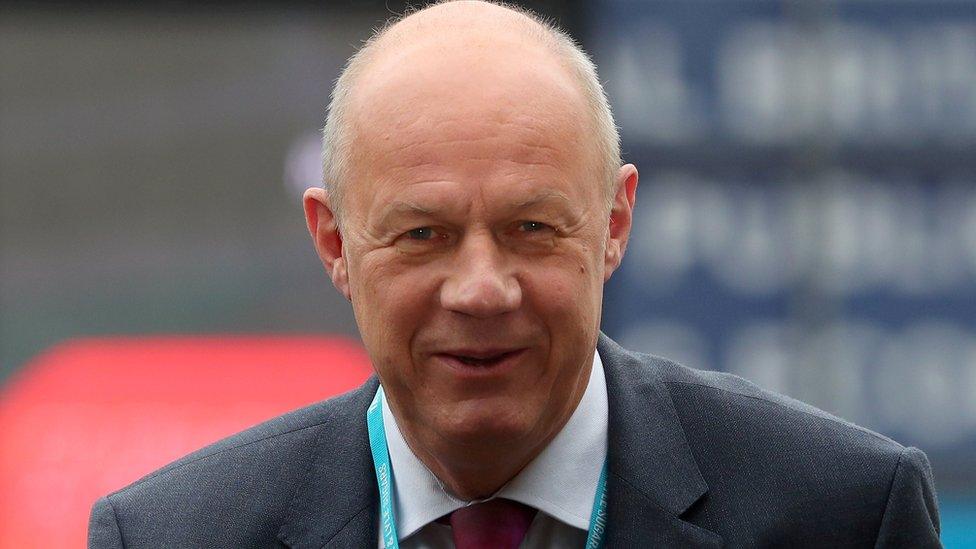Damian Green dismisses Brexit 'conspiracy theories'
- Published

Theresa May's former right-hand man has criticised colleagues "who won't accept evidence" on Brexit, and suggested more of Whitehall's economic forecasts should be published.
Damian Green rejected "conspiracy theories" that there was a plot to thwart the Leave vote.
And he acknowledged differences of opinion between ministers on Brexit.
Meanwhile ex-Brexit Minister David Jones said the Treasury was trying to "drag out" and "soften" the UK's exit.
Mr Green, the former first secretary of state, was sacked in December after being found to have made "inaccurate and misleading" statements over what he knew about claims pornography was found on his office computer in 2008.
In his first interview since leaving government, he spoke to BBC Radio 4 documentary The Ministry of Leave about the challenges facing the civil service as the UK prepares to leave the EU.
'Conspiracy theories'
Last month's leak of government forecasts predicting a hit to the economy as a result of Brexit provoked a political row, with some Tory Brexiteers aiming criticism at the civil service.
In the aftermath, Brexit Minister Steve Baker said Whitehall forecasts were never accurate, while prominent backbencher Jacob Rees-Mogg accused the Treasury of "fiddling the figures" on Brexit to maintain a close economic relationship with the EU.
Speaking to the BBC's Ben Wright, Mr Green hit back, saying: "I do reject all the conspiracy theories that suggest there's some sort of plot inside the official machine to thwart the will of the people.
The Ministry of Leave is on BBC Radio 4 at 20:00 GMT on 19 February
"There's a great problem of politicians who won't accept evidence. We can all argue about economic forecasts and none of them are 100% accurate but you have to rely on them and if you reject evidence you don't like then you are likely to end up producing faith based policies."
Asked whether some of his former cabinet colleagues were resistant to the facts and evidence, he replied, "not so much former cabinet colleagues.
"I think there are politicians who would prefer not to have the evidence there."
'Remain tendency'
Earlier this month MPs were allowed to see a set of regional forecasts that predicted hits to economic growth across the UK, based on three possible new trade arrangements.
The government has faced calls to publish all of its analysis of the impact of Brexit in full, but says that to do so at this stage would damage its hand in negotiations.
It also argues that its preferred option of a bespoke trade deal has not been modelled in the leaked forecasts.
Mr Green added: "If analysis is being produced then publish it. And frankly there will be a big political debate it. Let's have this argument in public, that's what democracies do."
He described Brexit as probably the hardest task faced by Whitehall since the Second World War.
'Department X'
Ministers are still discussing "the very big picture. which end state we want" he said, adding: "it's not a surprise to anyone there are differences of view inside the government on that".
Speaking on the same programme, former Brexit minister Mr Jones praised the civil service's response to the challenge of preparing for Brexit, but added: "Probably the last of the Remain tendency are deep within the bowels of the Treasury.
"There is a constitutional aversion in the Treasury to Brexit as a concept and I think in the Treasury there is an effort being made at the moment to try and drag the process out and soften it."
Mr Jones also said that Brexit Secretary David Davis had wanted the Department for Exiting the EU - set up after the Leave vote - to be called "Department X".
He added: "David Davis said subsequently that he preferred Department X because it had suitably sinister overtones which I think appealed to him as a former Special Forces officer."